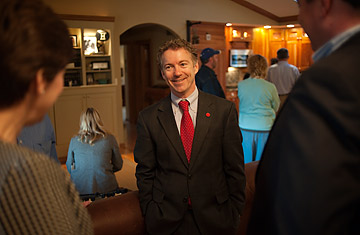
Republican Rand Paul, son of Texas Congressman Ron Paul, is running for the Kentucky Senate seat left vacant by the retirement of Jim Bunning
Rand Paul is either the Republican Party's best hope to keep a Senate seat in Kentucky or its worst nightmare.
Here's a little window into why:
"There are Tea Party–like candidates running across the country," notes Paul, who is running for the seat soon to be vacated by Jim Bunning. "Some people say I chastise the Republican Party too much. But I think it'll take an outsider. This is the year to do it. You need someone who will just say no. We could destroy our country with all these deficits. A lot of Republicans have been the problem. It's not all on [President] Obama, though he did make it a lot worse."
Paul, the Bowling Green ophthalmologist whose chief claim to fame is that his father Ron is the world's most famous libertarian, now leads a race he was never supposed to enter. And he leads it by as much as 20 points. In doing so, he is upsetting not only expectations in Kentucky but also overturning the local power structure: he has outraised Kentucky secretary of state Trey Grayson, the handpicked favorite son of Senate majority leader Mitch McConnell.
And he has done so running nearly as much against the GOP as he has against the Democrats and Obama. Not surprisingly, his campaign is being watched closely by Republicans who worry about the size and strength of the Tea Party movement — and the drain insurgencies like Paul's could have on their coffers.
"The biggest crowds I've been to in Kentucky have been Tea Party crowds. They're two to three times bigger than any Republican crowds," Paul says.
Paul, 47, is not a terribly charismatic speaker, and his political experience consists of filling in for his father on the 2008 campaign trail. If elected, Paul says, he'd work to reduce the deficit, lower taxes, strip the regulatory code and introduce legislation to limit members of Congress and Senators to 12 years in office — a move that would take a constitutional amendment to enforce, but the suggestion is always one of Paul's biggest applause lines. Sarah Palin and Steve Forbes have endorsed him.
After growing up in Surfside, Texas, where his father has been a Congressman on and off for more than 30 years, Paul went to Baylor University in Waco, Texas, and ophthalmology school at Duke University in North Carolina, and moved to Kentucky in 1993 to be near his wife's parents. He's not charming or debonair, but there's something about his wonky passion for debt and trade imbalances that seems to inspire people. It's easy to find folks who've never attended a political rally at his events, tossing $5 or $10 in the buckets that are usually passed around like a church plate. "I like that he's earnest; I feel like he's being honest with me and not telling me what I want to hear," says Steve Strodtman, a lifelong Republican in the town of Columbia, where some 75 people gathered recently to hear him speak. "I was disappointed with George W. Bush. It's nice to see someone returning the party to its conservative roots."
His success so far has the GOP establishment fighting back. In his ads, Grayson is attempting to paint Paul as a kook whose beliefs are outside the mainstream. Which may explain why on several issues, Paul is edging toward the center: Pure libertarians, he says, believe the market should dictate policy on nearly everything from the environment to health care. Paul has lately said he would not leave abortion to the states, he doesn't believe in legalizing drugs like marijuana and cocaine, he'd support federal drug laws, he'd vote to support Kentucky's coal interests and he'd be tough on national security.
"They thought all along that they could call me a libertarian and hang that label around my neck like an albatross, but I'm not a libertarian," Paul says between Lasik surgeries at his medical office, where his campaign is headquartered, with a few desks crammed between treatment rooms. "Frankly, I'd rather be coming from the right than from the left like Grayson, who not too long ago was a Democrat and Bill Clinton supporter." (Grayson voted for Clinton in 1992 before switching parties and entering politics in the mid-1990s.)
Paul's adjustments may leave him vulnerable to a challenge from the right. Bill Johnson, a former naval officer and Tea Party candidate who has poured his life savings — more than $200,000 — into his bid, sees opportunity too. "Grayson's the moderate, establishment candidate, and Paul's got a lot of support from his father's list," Johnson says. "I am the true Tea Party candidate." As with the beverage they are named after, Tea Party Republicans are taking many forms and flavors this year — and could produce many outcomes, some unintended, in the 2010 elections.
